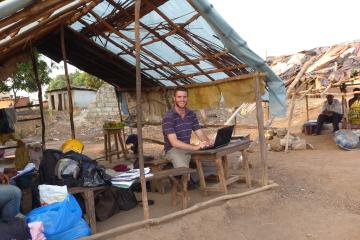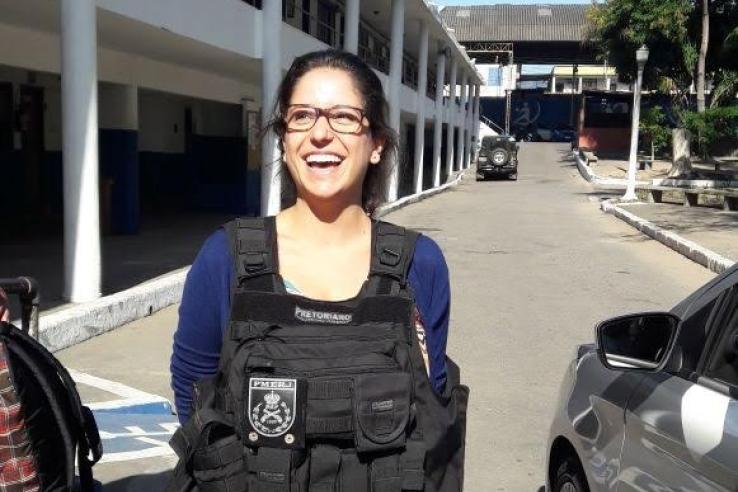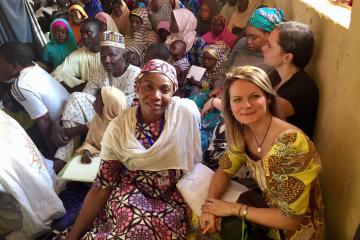
Julia Guerra Fernandes, J-PAL '17, on public safety and evidence use in Brazil

The Alumni Spotlight series highlights J-PAL alumni who are making an impact across industries and around the world. Formerly a research assistant at J-PAL Latin America and the Caribbean, Julia Guerra Fernandes ‘17 now leads Leme, an organization that collaborates with governmental and non-governmental entities to design and test interventions aimed at reducing violence in Brazil. She describes her journey from J-PAL to Leme in this post in our Alumni Spotlight series. If you'd like to learn more, you can connect with Julia at [email protected].
What first inspired you to build a career in the development and public policy space? And how did you first come to J-PAL?
My career has been driven by a deep commitment to understanding and addressing inequality. Brazil is a country defined by deep inequality—where some people face exclusion and structural prejudice from birth, while others observe these realities from a distance. I grew up in the latter group. My career has been shaped by both privilege and a desire to break out of the bubble I was born into. Looking back, I think my inspiration unfolded gradually, even before I encountered terms like “development” or “public policy.”
At 13, I began volunteering by reading stories to children in shelters who had been removed from their families by the justice system. This experience profoundly impacted me. These kids were about my age but lived realities that were worlds apart from my own. As a teenager, I continued volunteering in daycare centers, public schools, and NGOs. I also represented my state at a national youth conference, where I joined students from public schools, quilombola communities, accessibility advocates, and young people from across the country. That was my first exposure to real Politics—with a capital P. Around that time, I had to choose a field of study and decided on economics. I wanted to understand and dismantle systems of inequality from within (oh, the idealism of youth!).
Over the past decade, I’ve worked in government agencies and international organizations on key issues like education, health, and public security. I spent seven years in public institutions, including the Public Prosecutor's Office and the Citizen Security Institute in Rio de Janeiro. At some point, I realized I had become part of the system—and that meaningful change would be more incremental than I had once hoped. These experiences showed me the challenges and limitations of each sector and how they can complement each other. I firmly believe that public policies are a powerful tool to amplify impact and reach more people, and the third sector can play a vital role by complementing these efforts with its agility and capacity for innovation.
In 2016, after completing my master’s in economics, I was working as a consultant on public education projects in Brazil for the World Bank. A friend told me about a Research Assistant position at J-PAL on a project led by Claudio Ferraz (UBC and PUC-Rio) and Joana Monteiro (FGV/EBAPE and Leme)—economists I admired as an economics student. The role involved working directly with the Institute for Public Security in Rio de Janeiro (ISP). Although I had no prior experience in public security, the opportunity intrigued me, so I applied. At the time, most applied microeconomists focused on education and labor markets, with growing interest in health. Public security, however, was largely overlooked, despite Brazil being one of the most violent countries in the world, particularly for young people. Working in this field felt like a unique opportunity to maximize social impact. After my time with J-PAL, I was officially hired by the Rio de Janeiro state government, and I’ve been working on this topic ever since.
What aspect of your job at J-PAL LAC did you find most challenging and/or interesting?
One common challenge for researchers is understanding institutions from the outside. Before working at the Brazilian Institute of Geography and Statistics (IBGE), I used to joke that demographic census data were collected by magical beings who went door to door. In Brazilian society, the unknown is often seen as “the other.” This is especially true in public security, where victims are often seen as the children of “others,” living in distant realities.
Working at J-PAL was an incredible opportunity to step beyond data analysis and engage directly with real policymaking. It taught me the importance of challenging comfort zones and breaking through boundaries to foster meaningful mindset shifts. Achieving this requires not only knowledge, but also listening and empathy. As a research assistant at J-PAL, embedded within a government agency, I interacted with individuals whose life experiences and political views were very different from mine. My time at a police battalion—an environment I initially knew little about—was both challenging and enlightening. It gave me the chance to engage with diverse viewpoints and learn from the personal and professional journeys of those working in the field. Along the way, I also built lifelong friendships.
As a young woman and non-police officer in a predominantly male space, the role forced me to cultivate resilience and self-confidence. Women’s voices are often overlooked in these spaces, and while my conciliatory nature helped, it also required a lot of studying and listening. These experiences pushed me to grow both personally and professionally, and also strengthened my commitment to advocating for greater women’s representation and participation in these critical spaces.
You’ve spent the last several years between research and policy, all while pursuing a PhD. What motivated you to pursue this specific path?
My career path has been shaped by a constant pursuit of impact, even if it has been winding and, at times, unplanned. Rather than following a predefined trajectory, I’ve consistently sought opportunities where I believed I could meaningfully address pressing social challenges—often at the expense of financial stability. This focus on impact has required juggling multiple responsibilities and navigating the tensions between theory and practice. Bridging these two worlds is rarely comfortable: in practitioner settings, I’ve often felt too academic, while in academic circles, my practical focus can seem out of place.
After completing my master’s degree, I wasn’t sure I wanted to pursue a PhD. For seven years, I worked in public administration in Rio de Janeiro. In public institutions, I spent much of my time solving short- and medium-term problems that required quick responses and efficient use of resources. Public administration often prioritizes solutions over a deep understanding of the underlying problems. Additionally, political timing frequently dictates what can be accomplished. Doing good work doesn’t always guarantee immediate implementation; sometimes, it’s necessary to put work aside and wait for the right political window of opportunity.
In 2020, while working with juvenile data that had never been compiled before, I realized I had broader questions—particularly about the paths of juvenile offenders—that I couldn’t address within the constraints of public service. Public administration often demands immediate solutions, leaving little room for the kind of deep, systematic inquiry needed to fully grasp complex phenomena. Academia, by contrast, operates on a different timescale. It provides the space for deep, rigorous exploration of specific research questions, and fosters a collaborative environment, where ideas are challenged and refined. These elements were crucial for tackling questions at the frontier of knowledge while ensuring their relevance for policymakers.
This realization drove me to pursue a PhD, not only to deepen my understanding of these issues but also to contribute to the academic and policy debates surrounding juvenile justice. I am currently a visiting student at the University of Chicago, pursuing a PhD in Public Policy and Economics at Fundação Getulio Vargas (FGV EAESP). I am advised by Rudi Rocha (FGV EAESP and IEPS), with whom I also work on a research project at the Instituto de Estudos para Políticas de Saúde (IEPS) examining the impact of urban violence on health in Rio's favelas.
Earlier this year, you founded an NGO, Leme, to encourage the use of evidence in public security. Can you tell us more about how Leme came to be and what its mission is?
Leme Impact Lab is an independent organization that collaborates with governmental and non-governmental entities to design and test effective, feasible, and scalable interventions aimed at reducing violence in Brazil. Leme was founded based on the collective experiences my partners and I gained over the years working in both public sector roles and academia. Our mission is to support decision-makers to transform public security through the intensive use of data and scientific evidence. We achieve this by engaging in an iterative process of designing and testing interventions, identifying incremental solutions to complex social problems, and strengthening the institutional capacities of our partners. Led by economists with strong academic backgrounds and extensive public sector experience, Leme bridges the gap between academic research and urgent societal challenges, fostering collaboration among researchers, policymakers, and communities.
It is also significant that Leme, a lab dedicated to reducing violence in Brazil, is led by three women: Joana Monteiro (FGV/EBAPE and Leme), Laura Schiavon (UFJF and Leme), and myself. Both economics and public security pose significant barriers for women. In academia, gender differences become more pronounced as one advances through higher education. Female representation decreases sharply at higher academic levels, such as during master’s and PhD programs. In public security, these challenges are even greater, as the field has traditionally been male dominated, where women’s participation is often seen as unnecessary or limited, as seen in the case of the police in Rio de Janeiro. At Leme, we are committed to building a horizontal organization where everyone feels comfortable and valued.
How has your time at J-PAL informed your efforts?
It’s hard to imagine Leme existing without the influence of J-PAL. I co-founded Leme with Joana Monteiro, who mentored me during the J-PAL project in 2016. Since then, we’ve been working together across various institutions, achieving many successes, navigating challenges, and spending countless hours discussing how to maximize our impact. From the Public Prosecutor’s Office to the Getulio Vargas Foundation (FGV), and consulting for international organizations, our focus has always been on institutionalizing the use of evidence and educating the actors we collaborate with to improve their performance.
Over the years, Joana and I have spearheaded several initiatives that have significantly influenced public security and policy in Brazil. At the Institute of Public Security (ISP), we led the development of ISPGeo, a real-time crime analysis tool now widely used by the police in Rio de Janeiro for strategic planning. During our time at the Research Center at the Public Prosecutor’s Office, we coordinated projects on organized crime data, police oversight initiatives that reduced lethality during the pandemic, and the creation of unprecedented indicators to increase transparency and link the Prosecutor’s Office’s actions to tangible societal impacts. At the FGV Applied Public Security Research Center, we designed and evaluated programs like the Joint Prevention Strategies Program (CEP) in Rio, which aims to reduce street crime through urban requalification and prevention actions by the Municipal Guard. In São Paulo, our impact evaluation of body cameras revealed a 57% reduction in deaths caused by police interventions, influencing the government’s decision to continue the policy. These initiatives have played a critical role in shaping public security policy and practice in Brazil.
The current debate on public security in Brazil is often based on assumptions and clichés, such as calls for more police officers or patrol cars. Leme Impact lab, like J-PAL, was established to elevate this discussion by rigorously testing and refining initiatives that have proven successful. In Brazil, as in many developing countries, the challenges of designing and implementing policies are so significant that their mere execution is often considered an achievement. Consequently, activity indicators—such as the number of patrol cars deployed or police officers hired—are frequently presented as evidence of success.
What are some of the challenges you've faced in establishing Leme, and how have you addressed them?
We are still addressing challenges as we go. I’ll solve one as soon as I finish this interview! During Leme’s creation, we faced a variety of obstacles, from budget constraints to repeatedly revising our pitch, and fielding questions from people who believed the organization should be structured differently. Committing to social impact is a bigger decision than it may initially seem—it’s a political stance.
In practice, this means we prioritize pressing public issues and adopt robust methodologies, which doesn’t always align with what funders want to finance or media expectations. Many NGOs focus on concrete, immediate solutions, such as distributing books or offering courses. While these are important, Leme, as an impact lab, is dedicated to achieving long-term improvements that may only become evident over time. This commitment requires abstract thinking, strategic planning, and a deep understanding of the relationship between activities and their ultimate impacts. Balancing this forward-looking approach with the constraints of funding and public perception remains one of our greatest challenges.
In what ways do you think organizations like J-PAL and Leme can collaborate to advance development outcomes?
Organizations like J-PAL and Leme have much to offer one another. I highlight two main areas: resource support and evidence dissemination. First, access to funding—especially exploratory funds—is crucial. These resources enable the placement of high-quality research assistants directly within institutions, as I was at ISP. This makes a significant difference in contexts like Brazil, where the data culture is still developing. Having someone fully dedicated to data organization, proposal writing, etc. helps lay the groundwork for more robust impact evaluations in the future.
Second, J-PAL, as a globally recognized and respected organization, can be instrumental in addressing the challenge of disseminating knowledge. Without such efforts, valuable insights risk being confined to a narrow audience in Brazil. By leveraging its international presence, J-PAL can ensure that evidence and lessons learned reach broader audiences and inspire action beyond local boundaries.
What skills or experiences gained from working at J-PAL have you found useful in your own career?
In practical terms, I would highlight two dimensions that J-PAL helped me develop: focusing on problem resolution rather than just on solutions and gaining exposure to formal academic writing in English. Writing technical notes for J-PAL helped me become proficient in using direct and clear language in English. Although I had access to English-language courses throughout my life, this is an area I continue to improve on. This point is important because much of the cutting-edge research in science is published in English, a language that is not native to most developing countries. According to a study by the British Council, only 5% of Brazilians have some knowledge of English, and of those, only 1% are fluent. These figures are likely even worse among the Black population, creating a significant barrier to access opportunities.
What advice do you have for development professionals and researchers interested in starting their own nonprofit?
Choosing the right partners is a crucial step. It’s not enough to be professionally aligned; for a partnership to succeed, it requires shared values and a shared commitment to social impact. I’ve had past work experiences with my partners, Joana and Laura, where I witnessed how they responded to challenging situations. I admire them both personally and professionally. Another important piece of advice is not to wait until you have complete certainty about everything. It’s nearly impossible to be sure about the timing and structure of an organization in advance; you need to test and adjust as you go. Finally, being your own boss is very challenging and comes with no guarantee of a more peaceful life—it involves constant hard work, responsibility and some uncertainty.


